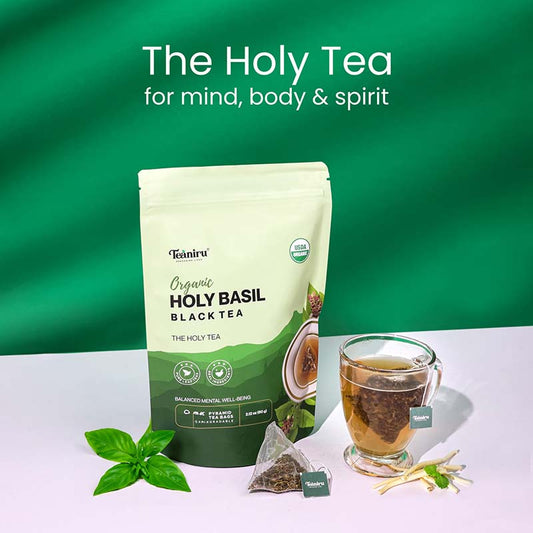Anti-Aging Tea
-
Regular price ₹ 650Price ₹ 650 Regular priceUnit price / per242 reviews
Add to cart -
Ceremonial Japanese Matcha Tea
Regular price ₹ 2,500Price ₹ 2,500 Regular priceUnit price / per152 reviewsAdd to cart
Best Anti-Aging Tea
Tea is enjoyed globally for its taste and variety of flavours. Certain teas offer potential benefits, including anti-ageing effects.
Various studies and research suggest that drinking tea can slow down biological ageing. Also, it helps support skin and hair and anti-ageing.
Benefits of Anti-Aging Tea
- Support Healthy Skin Ageing
- Help Remove Dead Cells in the Skin
- Protect the Skin from UV Damage
- Helps in the Regulation of Cellular Signalling
Support Healthy Skin Aging
Holy Basil or Tulsi Tea: The natural compounds such as ursolic acid, rosmarinic acid, and eugenol in Holy Basil or tulsi tea are rich in antioxidants.
These antioxidants help protect the skin from free radicals, unstable molecules that break down healthy skin cells and are one of the main causes of premature ageing.
By balancing these free radicals, holy basil or tulsi tea helps slow down the aging process of the skin, improving its appearance and reducing dullness and wrinkles.
Help Remove Dead Cells in the Skin
Hibiscus Tea: The natural substance known as alpha hydroxy acids (AHAS) in Hibiscus tea helps remove dead skin cells from the surface of the skin and then regenerate new ones, which gives a brighter, smoother and even skin tone.
Protect the Skin from UV Damage
Matcha Tea: Photoaging is the premature aging of the skin that is caused by frequent exposure to ultraviolet radiation, mainly from the sun.
The chlorophyll in matcha helps absorb the UV radiation and protects the skin from damage caused by sun exposure and reduce the premature aging of the skin.
Helps in the Regulation of Cellular Signalling
Cellular signalling is the process by which cells communicate with each other to perform various activities.
Tea contains polyphenols that interact with key proteins in the cell known as kinases, helping to send and receive signals and influencing cell growth.
The Bottom Line
Drinking tea can help slow down ageing and protect the skin from free radicals.
It aids in removing dead skin cells and offers some protection against UV radiation. Additionally, the polyphenols in tea positively influence cell growth.
However, while tea has numerous benefits for skin support and health, it is not considered a replacement for sunscreen.




